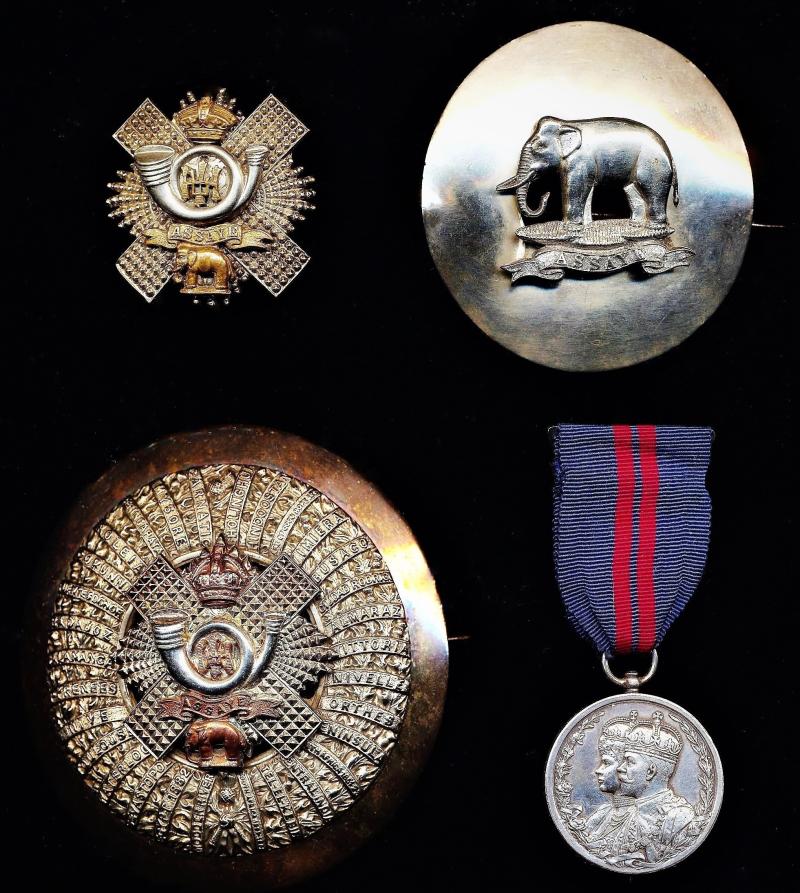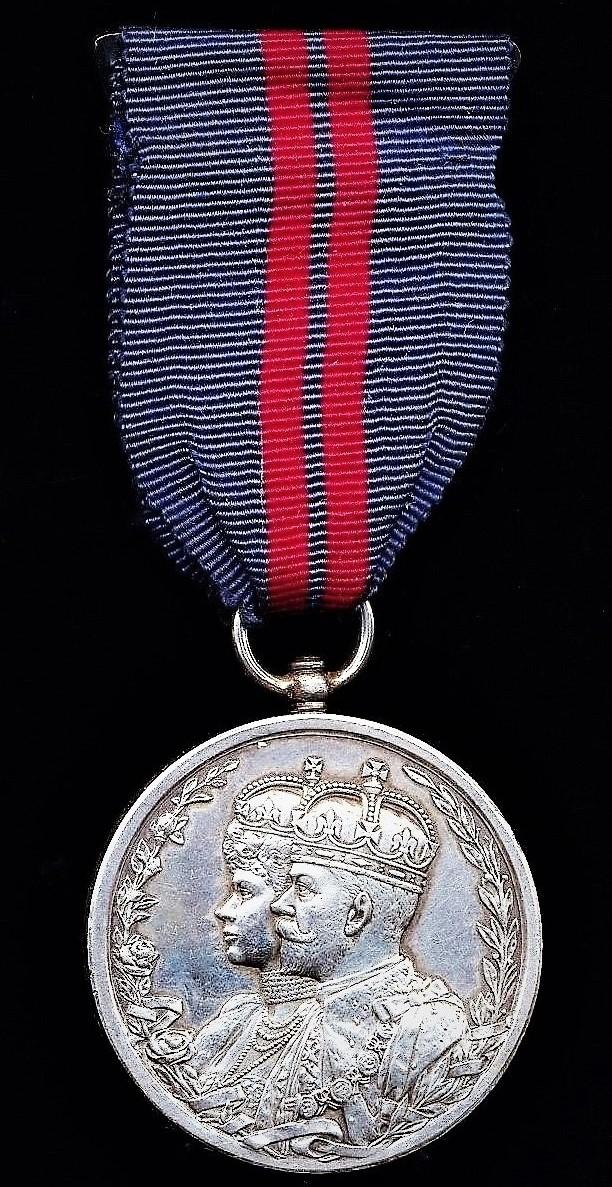An impressive Senior Scottish NCO's medal and regimental insignia ensemble for the 'Delhi Durbar': Colour Sergeant Andrew Kennedy McFadyen, 1st Battalion Highland Light Infantry
a). Delhi Durbar Medal 1911. Silver issue (5415 C.Sgt A.K. Macfadyen 1st Bn High Lt Infy)
b). Highland Light Infantry: Victorian Sergeants & senior NCO's bi-metal 'Glengarry' cap badge. With Victorian crown. This with customised reverse clasp and buckle fittings for wear as a belt buckle
c). 74th Highlanders (later 1881 2nd Battalion Highland Light Infantry): Sergeants & Pipers pattern regimental plaid brooch. White metal worn circa 1845-1901
d). Highland Light Infantry: Senior NCO's Regimental Plaid Brooch. Kings Crown 1902 issue (with recipient initials A K Mc etched on back)
Naming: The Delhi Durbar Medal engraved in the regimental style for this regiment / The HLI pattern plaid brooch with usual 'etched' initials on reverse 'A.K.M' - this latter still in it's white card box (a/f)
Note: The 74th Highlanders pattern plaid brooch continued to be worn by the Senior NCO's & Pipers of 2nd Battalion Highland Light Infantry circa 1881-1901, in which year the standard pattern HLI plaid brooch (with mutiple battle honours from Carnatic / Sholinghur through to South Africa 1902) was worn by senior NCO's of both regular battalions of the Highland Light Infantry
Medal verification: Confirmed as entitled per the respective medal roll for 1st Battalion Highland Light Infantry (ref WO). A total of medals awarded to the Highland Light Infantry
Recipient served 18 years 'With the Colours' prior to taking his discharge in 1912, and served a further 3 years during the Great War (Home Service). His only medal entitlement being the Delhi Durbar Medal as enumerated in his extant service papers
Andrew Kennedy McFadyen, son of Ferdinand McFadyen (a tailor) and Mary McFadyen (nee Kennedy) was a native of Glasgow, Lanarkshire, Scotland, where he was born in 1876. Described as a 'Fitter' Andrew enlisted in the British Army, at Glasgow, Scotland, on, 20 August 1894, and was posted to his local infantry regiment, the Highland Light Infantry. Prior to joining the Regular Army, Andrew had served the 1st Lanarkshire Artillery Volunteers. Andrew served with 1st Battalion Highland Light Infantry, at 'Home' and overseas in Malta, prior to being transferred to 2/HLI on, 15 February 1898. Promoted to Sergeant on, 14 April 1902, and to Colour Sergeant on, 1 April 1905. He was transferred to 1/HLI, on, 5 December 1911, and in 1912, took his discharge, 'at his own request', at, Lucknow Cantonment, India, having completed 18 years service 'With the Colours'. During his first period of service with the British Army, William had served a total of 18 years & 80 days in the below locations;
- Home: 20/08/1894 - 08/02/1895 (173 days)
- Malta: 09/02/1895 - 14/02/1898 (3 years 6 days)
- India: 15/02/1898 - 04/02/1899 (355 days)
- Ceylon: 05/02/1899 - 17/02/1900 (1 year 13 days)
- Home: 18/02/1990 - 04/12/1907 (7 years 290 days)
- India: 05/12/1907 - 22/10/1912 (4 years 323 days)
- Home: 23/10/1912 - 07/11/1912 (16 days)
Evidently a model soldier, by the time of his discharge, he held 1st, 2nd and 3rd class Education Certificates, together with Certificates in 'Musketery' & in 'Machine-Guns'. During his Military Service his notified 'Next of Kin' was his father, Ferdinand McFadyen, who lived at, 48 Kirkland Street, Glasgow, Scotland. Andrew married Amelia Sarah Jane Titcombe at Goring, Oxfordshire, on 28 October 1901. The couple were blessed with three children, all sons, vide, Andrew Kennedy McFadyen (the eldest), who was born on, 9 October 1904, and twins Ferdinand Richard McFadyen (commissioned 1940 and served Royal Tank Regiment / Royal Armoured Corps) and William Kennedy McFadyen, who were born on, 14 March 1914. Andrew re-enlisted in the British Army on 11 January 1915, at which time he had been living with his family at, 38 Grange Grove, Reading, Berkshire, and was posted to his 'local' infantry regiment, the Royal Berkshire Regiment, in which unit he held the rank of Colour Sergeant. Andrew took his final discharge from the British Army on, 25 October 1919. During the Great War, Colour-Sergeant McFadyen did not serve overseas, and remained on 'Home Service' in a training capacity. After discharge, the McFadyens relocated to Scotland, where in the 1921 Scottish Census they are showing as living in Blantyre, Lanarkshire, Scotland
The Delhi Durbar medal retaining its original long length of silk riband, and 'as-worn' in the swing style by the recipient. The silk riband suspended from a white metal mounting bar, this latter complete with the long hinged pin & clasp fittings
The recipients service papers are extant, and held & accessible at The National Archives
A superb regimental ensemble, the plaid brooch having been worn by the recipient at the magnificent Delhi Durbar of 1911, whereat the 1st Battalion Highland Light Infantry were presented with new 'Colours' from the hands of the 'King Emperor'
See other separate listings on the website for medals and insignia to one of his son's
Condition: Mostly GVF
Code: 22515







